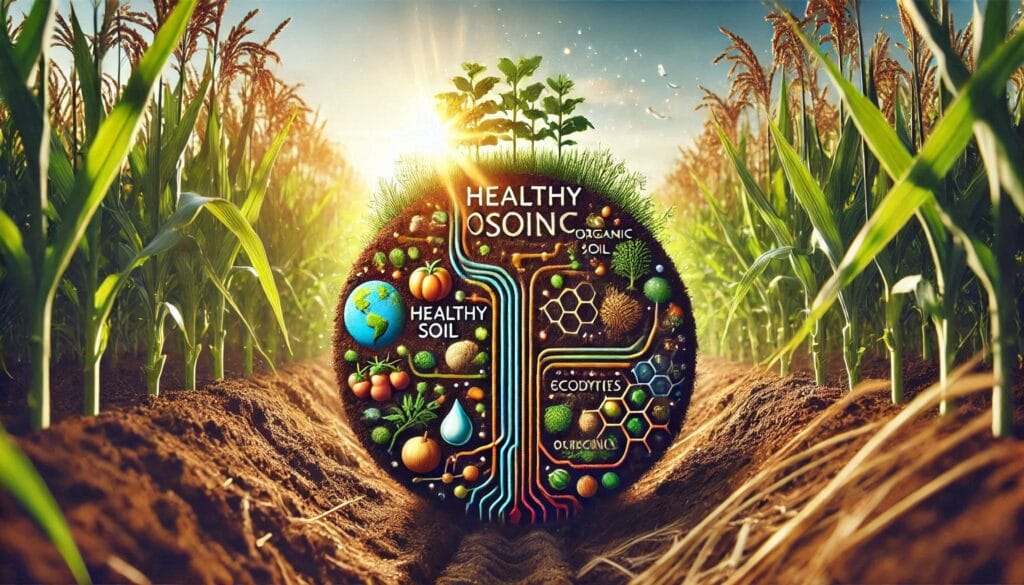Soil is more than just dirt; it is a living, breathing ecosystem that is the foundation for all plant growth. In organic farming, soil health plays a crucial role in ensuring sustainable agriculture, improving crop yields, and maintaining environmental balance. Without healthy soil, farming becomes increasingly difficult, and the quality of produce declines. In this blog, we will explore why soil health is essential in organic farming, how it affects the ecosystem, and practical steps to maintain and improve soil quality.
The Importance of Soil Health in Organic Farming

Healthy soil is the backbone of organic farming. Unlike conventional farming, which relies on synthetic fertilizers and pesticides, organic agriculture emphasizes natural methods to nourish the soil and enhance its fertility. Here are a few reasons why soil health is critical:
1. Supports Plant Growth
Soil provides essential nutrients, water, and a stable structure for plants to grow. Without nutrient-rich soil, crops struggle to reach their full potential, leading to poor yields and weak plants.
2. Enhances Microbial Activity

Healthy soil is teeming with beneficial microorganisms like bacteria, fungi, and earthworms. These organisms help break down organic matter, making nutrients more accessible to plants and improving soil structure.
3. Reduces Dependency on Chemical Inputs
In organic farming, soil fertility is maintained through composting, crop rotation, and using natural amendments. This reduces the need for synthetic fertilizers and pesticides, making farming more sustainable and environmentally friendly.
4. Improves Water Retention and Drainage
Soil with good organic content holds moisture efficiently, reducing the need for excessive irrigation. At the same time, well-structured soil prevents waterlogging, allowing roots to breathe and absorb nutrients properly.
5. Promotes Carbon Sequestration
Healthy soil absorbs and stores carbon dioxide from the atmosphere, helping mitigate climate change. Organic farming practices contribute to soil’s ability to store carbon, making it an essential player in combating global warming.
Factors That Affect Soil Health
Several factors influence soil health, and understanding them is key to maintaining a fertile and productive farm:
1. Soil Structure

Well-aerated soil allows roots to penetrate easily and promotes water movement. Compacted soil, on the other hand, hinders plant growth and reduces microbial activity.
2. Soil pH
The pH level determines nutrient availability in the soil. Most crops thrive in a slightly acidic to neutral pH range (6.0–7.0). Maintaining proper pH ensures that plants receive the nutrients they need.
3. Organic Matter Content
Organic matter, such as decomposed plant material and manure, enriches soil with essential nutrients and improves its structure.
4. Soil Erosion and Degradation
Excessive tilling, deforestation, and improper land management can strip the soil of its nutrients and structure, leading to reduced fertility over time.
How to Improve Soil Health in Organic Farming
Maintaining and improving soil health requires conscious effort and sustainable farming practices. Here are some proven techniques:
1. Composting
Adding compost to soil enhances its nutrient content and promotes microbial activity. Composting kitchen scraps, manure, and crop residues creates a nutrient-rich amendment that benefits the soil.
2. Crop Rotation
Rotating crops prevents nutrient depletion and disrupts pest cycles. Different crops have varying nutrient needs, and alternating them helps maintain a balanced soil profile.
3. Cover Cropping
Planting cover crops like clover or legumes improves soil structure, prevents erosion, and fixes nitrogen in the soil, making it available for future crops.
4. Mulching
Applying mulch around plants retains moisture, suppresses weeds, and adds organic matter to the soil as it decomposes.
5. Reducing Tillage
Minimizing soil disturbance helps preserve soil structure and microbial life. No-till or minimal-till farming maintains soil integrity and reduces erosion.
6. Adding Organic Amendments
Using natural fertilizers like bone meal, fish emulsion, and compost tea boosts soil fertility without harming the environment.
7. Encouraging Biodiversity
Integrating trees, shrubs, and beneficial insects into the farm ecosystem enhances soil stability and promotes natural pest control.
Conclusion
Soil health is the foundation of organic farming and plays a vital role in producing high-quality, nutrient-rich crops. By focusing on sustainable soil management practices like composting, crop rotation, and minimal tillage, farmers can maintain soil fertility, increase crop yields, and contribute to a healthier planet. Investing in soil health today ensures the long-term success of organic farming for generations to come.
Why Is Soil Health Important to Food Production?
Soil health is crucial for food production because it directly affects crop growth, yield, and nutritional value. Healthy soil provides essential nutrients, retains water efficiently, supports beneficial microorganisms, and enhances resilience against pests and diseases. Without fertile soil, agricultural productivity declines, leading to food shortages and lower-quality produce.
Why Soil Health?
Soil health is the foundation of sustainable agriculture and environmental balance. It ensures long-term fertility, reduces erosion, improves water filtration, and supports biodiversity. Maintaining soil health helps combat climate change by increasing carbon sequestration and reducing reliance on chemical fertilizers.
Why Is Soil Health Important?
Healthy soil supports ecosystems, provides food security, and sustains livelihoods. It enables plants to absorb nutrients, improves crop resistance to extreme weather, and reduces pollution from agricultural runoff. Investing in soil health ensures that future generations can continue to grow food efficiently and sustainably.
Who Benefits from Soil Health?
- Farmers: Higher crop yields, lower input costs, and improved resilience to climate change.
- Consumers: Access to more nutritious and chemical-free food.
- Environment: Reduced soil erosion, improved water quality, and enhanced carbon sequestration.
- Wildlife: Healthier habitats due to improved biodiversity and reduced pollution.
Which Activities Improve Soil Health?
- Composting: Enriches soil with organic matter and nutrients.
- Crop Rotation: Prevents nutrient depletion and reduces disease risks.
- Cover Cropping: Protects soil from erosion and improves its structure.
- Reduced Tillage: Minimizes soil disturbance, preserving beneficial microorganisms.
- Organic Fertilization: Enhances soil fertility naturally without synthetic chemicals.
- Agroforestry: Integrates trees and crops to improve soil stability and fertility.



Pingback: Why Organic Farming is Better for the Environment 2025
Pingback: How to Test Your Soil for Nutrients and pH 2025